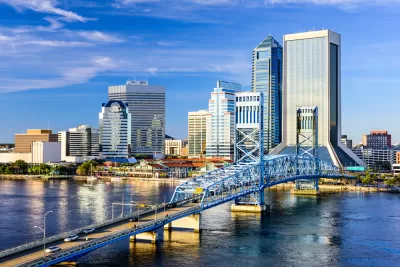The city of Jacksonville's new resiliency department will evaluate the city's long-term needs and coordinate with various stakeholders to implement systems adaptable to extreme climate events.

Brendan Rivers interviews Anne Coglianese, the first Chief Resiliency Officer for the city of Jacksonville. Coglianese, who "came to Jacksonville from New Orleans, where she served as Coastal Resilience Manager from 2017 to 2020," defines resiliency as "the ability of city systems to adapt and thrive in the face of acute shocks like a hurricane or chronic stresses like sea level rise or urban heat."
As climate change intensifies the effects of extreme weather, resiliency is more important than ever, particularly for coastal cities. Coglianese's job entails "breaking down silos within city government, working with outside stakeholders and the independent authorities in and around Jacksonville that make decisions, whether that’s JEA or JTA, and making sure that everyone’s pushing in the same direction and thinking long term." She sees the "luxury" to think long-term as one of the most important aspects of her work, which will let her department "really look at what’s the latest in science and data, where do we need to go and then what interventions need to be put in place to allow city departments to move in that direction together."
For Jacksonville, flooding and urban heat pose some of the biggest risks. To address those risks, Coglianese sees "gray infrastructure and green infrastructure as working in concert together. For a city to be resilient, you need some of those redundancies built in." Coglianese also addresses equity as a crucial part of building resiliency and believes her department's work "needs to be developed based on the best science and data and models."
FULL STORY: A Q&A With Jacksonville’s First-Ever Chief Resilience Officer

Planetizen Federal Action Tracker
A weekly monitor of how Trump’s orders and actions are impacting planners and planning in America.

Maui's Vacation Rental Debate Turns Ugly
Verbal attacks, misinformation campaigns and fistfights plague a high-stakes debate to convert thousands of vacation rentals into long-term housing.

San Francisco Suspends Traffic Calming Amidst Record Deaths
Citing “a challenging fiscal landscape,” the city will cease the program on the heels of 42 traffic deaths, including 24 pedestrians.

Defunct Pittsburgh Power Plant to Become Residential Tower
A decommissioned steam heat plant will be redeveloped into almost 100 affordable housing units.

Trump Prompts Restructuring of Transportation Research Board in “Unprecedented Overreach”
The TRB has eliminated more than half of its committees including those focused on climate, equity, and cities.

Amtrak Rolls Out New Orleans to Alabama “Mardi Gras” Train
The new service will operate morning and evening departures between Mobile and New Orleans.
Urban Design for Planners 1: Software Tools
This six-course series explores essential urban design concepts using open source software and equips planners with the tools they need to participate fully in the urban design process.
Planning for Universal Design
Learn the tools for implementing Universal Design in planning regulations.
Heyer Gruel & Associates PA
JM Goldson LLC
Custer County Colorado
City of Camden Redevelopment Agency
City of Astoria
Transportation Research & Education Center (TREC) at Portland State University
Jefferson Parish Government
Camden Redevelopment Agency
City of Claremont





























